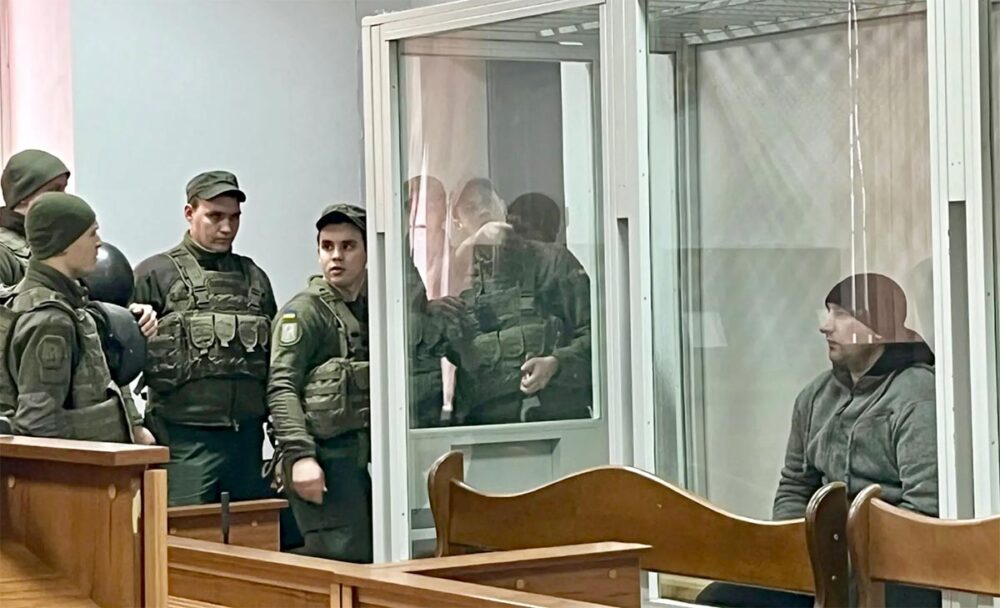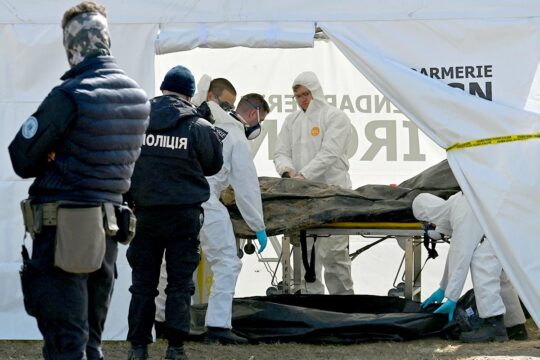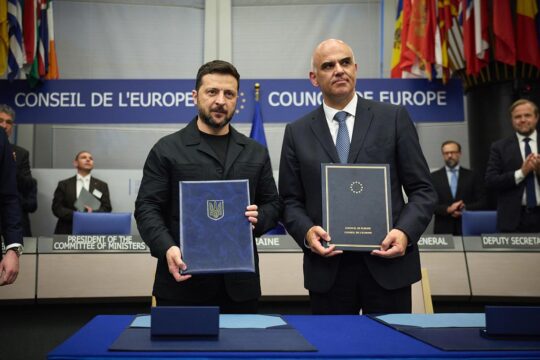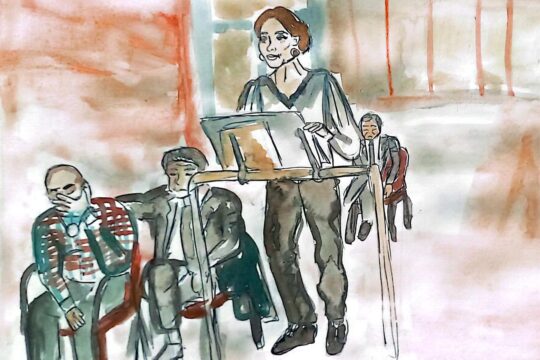3 January 2024, 12 pm, Shevchenkivskyi District Court of Kyiv. A dozen journalists and a few informal attendees have already gathered in the corridor. They will be the first to hear the verdict for the man investigators have described as the chief torturer of the illegal prison "Izolyatsiya" in Donetsk, Eastern Ukraine.
Accompanied by security guards, Denys Kulikovskyi entered the courtroom. He had a dedicated seat – the defendant's dock inside a glass box (the bars were replaced with these transparent walls to make not yet convicted people feel more comfortable). In the so-called "aquarium," the accused stood with his head down and did not look at the journalists trying to take pictures of him. Most of Kulikovskyi’s preliminary hearings over the past three years have been held without any audience. But journalists and the public were allowed to hear his sentencing. The presiding judge Yevhen Martynov read out the judgment for six minutes, providing only limited information about the accused – findings that were essential to the verdict.
Hellish testimonies from "Izolyatsiya" prison
Denys "Palych" Kulikovskyi is a native of Maryinka district, Donetsk oblast, in Eastern Ukraine. From 2014 to 2018, he was allegedly in charge of the "Izolyatsiya" prison, established by supporters of the self-proclaimed "Donetsk People’s Republic" (DPR), after the beginning of the war in Ukraine in 2014, with support from Russia.
The war crimes that "Palych" is accused of were first revealed by prisoners of "Izolyatsiya" who were released in December 2019. They claimed that Kulikovskyi not only directed the guards but also personally beat Ukrainian prisoners, tortured them with electric shocks, raped them in unnatural ways and practiced other methods of assault against them. Eyewitnesses added: "Kulikovskyi often drank, so he would also inflict torture while intoxicated."
"There were tortures. There were electric shocks. There were regular beatings. They were pouring boiling water on my head. Do you know what a "karcher" is?” asked former prisoner Stanislav Pechonkin in an interview with Free Radio. “It's a pump, a device for washing cars, it sends a jet of water under high pressure. They used it to spray me outside. In the cold. It was a very unpleasant sensation, I must say. Well, this is some of what was happening there."
"I was tortured with electric shocks. Then, for some reason, they inserted a catheter in the area of my carotid artery, connected a wire to my genitals, turned it on and then off, I don't know why – maybe they didn't give me enough voltage. I lost consciousness, and I remember being dragged down the stairs. Four times I "went for tapik, to drink coffee," Ukraine’s Public Broadcasting company Suspilne quoted Valeriy Sokolov, another former prisoner of "Izolyatsiya" who spent almost two years in captivity. ("tapik" is a military field telephone, its wires were used to wind around people's fingers, toes or genitals for torture. Kulikovskyi would first offer a cup of coffee before the torture starts.)
A full conviction and civil damages
In 2018, the DPR occupiers dismissed Kulikovskyi from the prison's command, and later Kulikovskyi himself was allegedly subjected to torture there. In 2021, he was arrested in Kyiv by the SBU, Ukraine’s security services. According to Kulikovskyi, he had been living there since 2019. He was then placed in a pre-trial detention center, and during one of the hearings, when journalists were allowed inside, he said: "I did everything, I am guilty, I repent."
On December 22, 2023, the court gave Kulikovskyi the opportunity to say a final word before the sentencing, but he refused to say anything.He was found guilty of "terrorist act", "committing a crime by a group of persons, a group of persons by prior conspiracy, an organized group or a criminal organization” and "violation of the laws and customs of war". He was acquitted, however, of "human trafficking".
"Basically, the court found him guilty of committing all the actions that the pre-trial investigation authorities and the prosecutor had charged him with. However, the court concluded that one of the incriminated crimes was actually covered by another criminal offence, so he was not convicted under this article," explained Maryna Antoniuk, the speaker judge of the Shevchenkivskyi District Court.
"There are 22 victims in these proceedings. These are people who have been tortured and abused during their illegal detention and imprisonment in this torture chamber. Two victims filed civil lawsuits, and they were partially successful," the speaker judge added. Kulikovskyi will have to compensate the two survivors with 95,000 Hryvnia (about 2,300 euros) and 400,000 Hryvnia (about 9,700 euros) in moral damages.
"Palych" was sentenced to 15 years in prison with confiscation of property. Exactly the sentence requested by the prosecution. The former warden of "Izolyatsiya" showed no emotions.
- "Kulikovskyi, do you understand the content of the verdict? asked the judge.
- Yes.
- Is the procedure for filing an appeal clear?
- Yes."
The dissatisfaction of Nobel Prize Oleksandra Matviychuk
"Since the crimes were committed during the so-called Savchenko law, the provisions of the law apply to this person and the time in custody is counted as one day of detention for two days of the preliminary imprisonment," Antoniuk said. As a result, "Palych" has about eleven years left to serve.
The announcement of Kulikovskyi’s sentence was attended by human rights defender and Nobel Prize winner Oleksandra Matviychuk, who documented the testimonies of people who had survived the torture in prison. In her opinion, "Palych" should have been given a more severe sentence. "I truly don't understand why the public prosecution requested only 15 years. The judge has granted this request in full, but part 2 of Article 138 of the Criminal Code still provides for the possibility of requesting life imprisonment. I will confer with the victims' lawyers and others on procedural nuances. I have been gathering testimonies from people who survived "Izolyatsiya". For me, these stories indicate that based on the totality of his crimes, he should be in prison for the rest of his life. We need to find a procedural solution,” she commented.
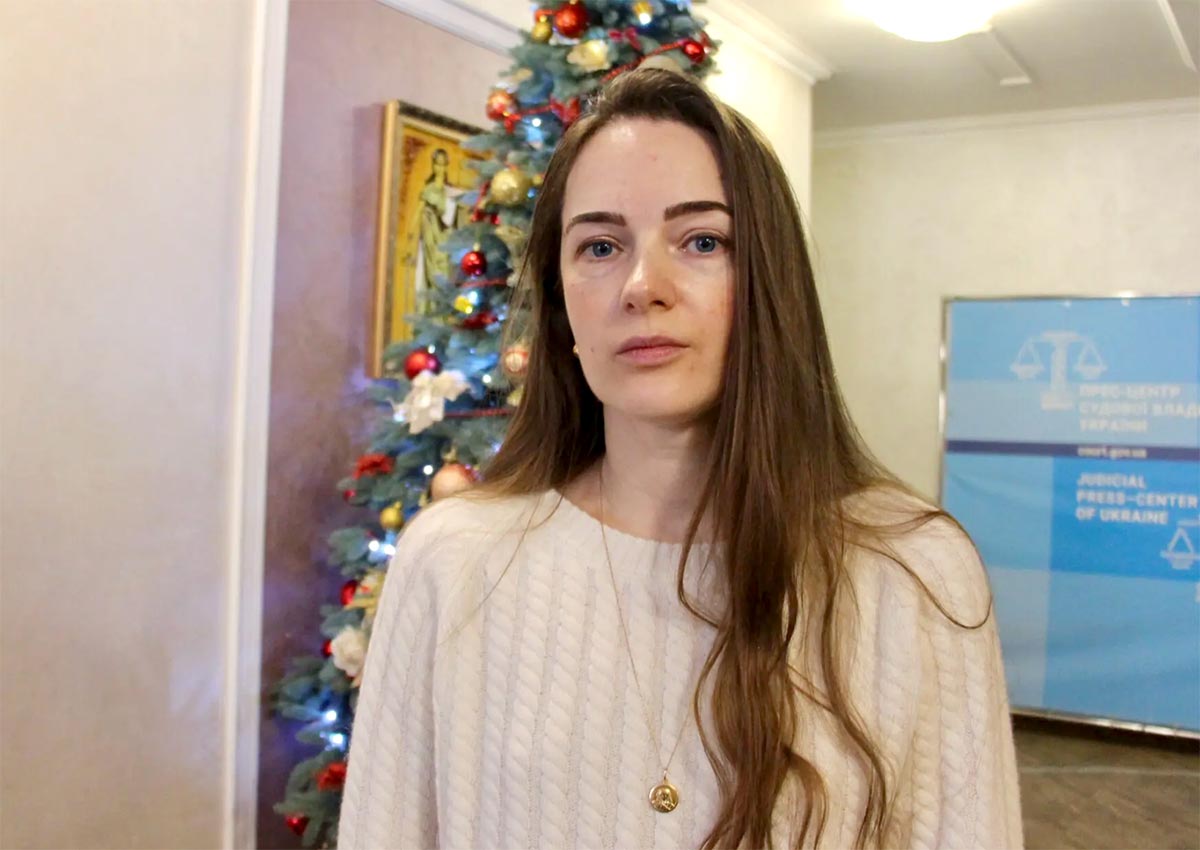
Oleg Gorbachev, lawyer of one of the prisoners of "Izolyatsiya", journalist Stanislav Aseyev, disagreed. "The court granted in full what the Prosecutor General's Office requested. Therefore, we do not have the possibility to file an appeal, as we will not be able to request more. In other words, the verdict was delivered in full compliance with what the prosecutor's office had submitted to the court. Let's look at other high-profile cases. Recently, there was the Pushilin's case, who was also sentenced to 15 years in absentia. Therefore, we must deal with the existing circumstances. And for me, it is actually very important that this verdict exists at least in some form," the lawyer said.
Not an ordinary trial
Kulikovskyi's public defender was not present at the court hearing. According to Gorbachev, he had previously requested that his client be acquitted of all charges and was present at most of the closed hearings. "We have these torture chambers in Olenivka [in Russia-occupied Crimea] and Horlivka [in Donetsk region]. It is crucial that those citizens of Ukraine who have betrayed their oath of allegiance to Ukraine [Kulikovskyi holds a Ukrainian passport] see that Ukrainian justice will get to all of them sooner or later. And it is very important that other people receive relevant notifications of suspicion. So that these people would not end up in foreign countries other than the aggressor state," continued Gorbachev.
"This trial is very important to me,” says Matviychuk. “It should have been highly publicized. I understand that there is a lot of pain now, and there are not many people here who came to listen [to Kulikovskyi’s sentence]. But this is not an ordinary trial, and I think Ukraine needs to show that those who torture, rape and kill [Ukrainians] will be pursued, found and punished."
This report is part of our coverage of war crimes justice produced in partnership with Ukrainian journalists. A first version of this article was published on the "Free Radio" website.


